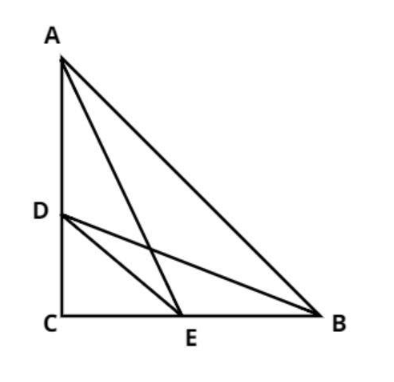
D and E are points on the sides CA and CB respectively of a triangle ABC right angled at C.
Prove that: $A{E^2} + B{D^2} = A{B^2} + D{E^2}$
Answer
625.5k+ views
Hint: Apply Pythagoras theorem here while solving.
Pictorial representation of the given problem is shown below.

Two points D and E are on the sides AC and AB.
We have to prove $A{E^2} + B{D^2} = A{B^2} + D{E^2}$
Join the point D with B and E and the point E with A.
Proof: -
Using Pythagoras Theorem,
We know that
${\text{Hypotenuse}}{{\text{e}}^2} = {\text{Perpendicular}}{{\text{r}}^2} + {\text{Bas}}{{\text{e}}^2}$
In $\Delta ACE,$
$A{E^2} = A{C^2} + C{E^2}.........\left( 1 \right)$
In $\Delta BCD,$
$B{D^2} = D{C^2} + B{C^2}.........\left( 2 \right)$
In $\Delta ABC,$
$A{B^2} = A{C^2} + B{C^2}.........\left( 3 \right)$
In $\Delta DCE,$
$D{E^2} = D{C^2} + C{E^2}.........\left( 4 \right)$
Now, consider L.H.S which is$A{E^2} + B{D^2}$
From equation (1) and (2)
$A{E^2} + B{D^2} = A{C^2} + C{E^2} + D{C^2} + B{C^2}.........\left( 5 \right)$
Now, consider R.H.S which is$A{B^2} + D{E^2}$
From equation (3) and (4)
$A{B^2} + D{E^2} = A{C^2} + B{C^2} + D{C^2} + C{E^2}.........\left( 6 \right)$
Now from equation (5) and (6) it is clear that L.H.S = R.H.S
Therefore $A{E^2} + B{D^2} = A{B^2} + D{E^2}$
Hence Proved.
Note:In such types of questions first draw the pictorial representation of the given problem then, apply Pythagoras Theorem in all different right angle triangles which is right angled at C, then find out the value of L.H.S and R.H.S separately, then we see that both are equal which is the required result.
Pictorial representation of the given problem is shown below.

Two points D and E are on the sides AC and AB.
We have to prove $A{E^2} + B{D^2} = A{B^2} + D{E^2}$
Join the point D with B and E and the point E with A.
Proof: -
Using Pythagoras Theorem,
We know that
${\text{Hypotenuse}}{{\text{e}}^2} = {\text{Perpendicular}}{{\text{r}}^2} + {\text{Bas}}{{\text{e}}^2}$
In $\Delta ACE,$
$A{E^2} = A{C^2} + C{E^2}.........\left( 1 \right)$
In $\Delta BCD,$
$B{D^2} = D{C^2} + B{C^2}.........\left( 2 \right)$
In $\Delta ABC,$
$A{B^2} = A{C^2} + B{C^2}.........\left( 3 \right)$
In $\Delta DCE,$
$D{E^2} = D{C^2} + C{E^2}.........\left( 4 \right)$
Now, consider L.H.S which is$A{E^2} + B{D^2}$
From equation (1) and (2)
$A{E^2} + B{D^2} = A{C^2} + C{E^2} + D{C^2} + B{C^2}.........\left( 5 \right)$
Now, consider R.H.S which is$A{B^2} + D{E^2}$
From equation (3) and (4)
$A{B^2} + D{E^2} = A{C^2} + B{C^2} + D{C^2} + C{E^2}.........\left( 6 \right)$
Now from equation (5) and (6) it is clear that L.H.S = R.H.S
Therefore $A{E^2} + B{D^2} = A{B^2} + D{E^2}$
Hence Proved.
Note:In such types of questions first draw the pictorial representation of the given problem then, apply Pythagoras Theorem in all different right angle triangles which is right angled at C, then find out the value of L.H.S and R.H.S separately, then we see that both are equal which is the required result.
Recently Updated Pages
Master Class 10 Computer Science: Engaging Questions & Answers for Success

Master Class 10 General Knowledge: Engaging Questions & Answers for Success

Master Class 10 English: Engaging Questions & Answers for Success

Master Class 10 Social Science: Engaging Questions & Answers for Success

Master Class 10 Maths: Engaging Questions & Answers for Success

Master Class 10 Science: Engaging Questions & Answers for Success

Trending doubts
What is the median of the first 10 natural numbers class 10 maths CBSE

Which women's tennis player has 24 Grand Slam singles titles?

Who is the Brand Ambassador of Incredible India?

Why is there a time difference of about 5 hours between class 10 social science CBSE

Write a letter to the principal requesting him to grant class 10 english CBSE

State and prove converse of BPT Basic Proportionality class 10 maths CBSE




